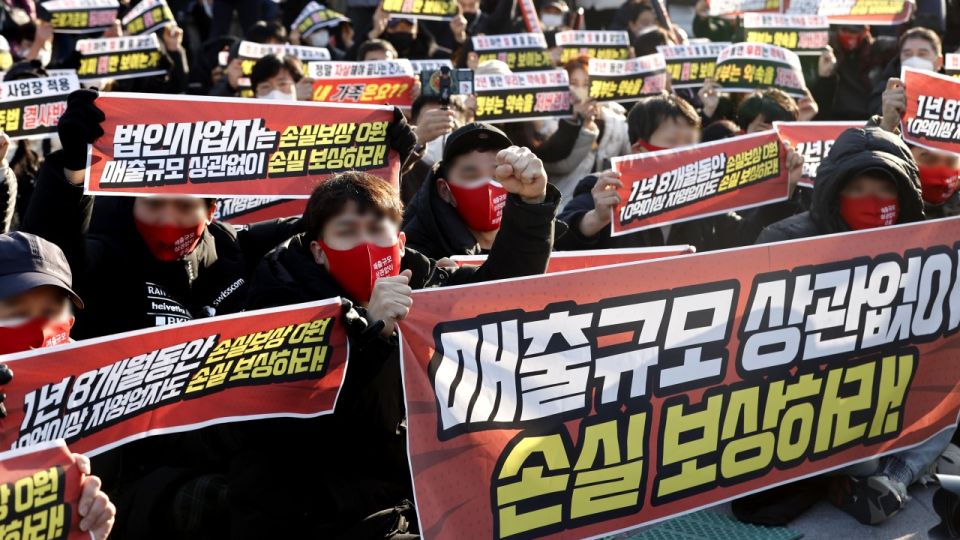December 23, 2021
Hundreds of small business owners took to the streets in Seoul on Wednesday to express their pent-up anger over the government‘s retightening of COVID-19 protocols nationwide.
Chants of “Stop politically-motivated quarantine measures that kill all business owners” resounded throughout Gwanghwamun Plaza in central Seoul, as the large group of protesters demanded an immediate lift of gathering bans and operation hour limits.
“The more than three-month long level four social distancing in the greater Seoul area, the vaccine pass system imposed on businesses just a month after the government‘s ‘gradual return to normal’ and the recent gathering ban and operation hour limits have threatened the livelihoods of small business owners,” said Oh Sae-hee, president of the Korea Federation of Micro Enterprises, during a speech at the event.
“There’s still a long way ahead to recovery due to extended anti-virus measures and the government‘s insufficient compensation for damages,” Oh added.
The group urged the government abolish the vaccine pass system, end the 9 p.m. curfew on businesses and increase financial compensations for small businesses.
It also requested the government reconsider applying the Labor Standards Act to small businesses of less than five workers, saying it could add a burden to business owners already hurt from the pandemic.
Demonstrators also hinted at staging an even larger protest if demands are not met.
The protest was originally registered to be attended by 299 people to abide by government‘s gathering limit placed on public protests. While the actual number of attendees is unknown, at around 4:00 pm, some protesters who were barred from entry clashed with the police on the edge of the barricades.

Protestors demanding entry clash with the police at barricades surrounding a protest held in Gwanghwamun, central Seoul, Wednesday. (The Korea Herald/Kang Jae-eun)
Wednesday’s demonstration comes amid a growing number of small business owners feeling the pinch over prolonged COVID-19 social distancing rules hindering their operations.
According to a survey by the Korea Economic Research Institute, 33 percent of 500 business owners who were polled said they might have to shut down in the next three months due to financial difficulties caused by government restrictions due to coronavirus.
Some have been pushed to the edge. An owner of a Chinese restaurant in Jamsil, southern Seoul, made headlines after a local media report said that the owner died by suicide after financial difficulties, just four days after the government retightened measures.
As of this month, 24 self-employed people have taken their lives over the past two years, according to a business owner advocacy group.
Tempers have escalated even more recently, after the government announced in early December it would retighten antivirus measures as caseloads nationwide started soaring into the 7,000s under its “Living with COVID-19” initiative.
Since then, private social gatherings of five or more people have been banned and individuals are required to verify their vaccination status at restaurants and other multiuse facilities.
Some business owners have refused the government’s antivirus measures.
A franchise cafe owner drew media attention recently after declaring online the coffeehouse would stay open 24/7 in protest of the government‘s operating hours restriction. Some coffee shops have decided to even allow the entry of unvaccinated individuals.

An official from the Ministry of SMEs and Startups speaks to the press. (Yonhap)
With woes deepening among small businesses owners, the Ministry of SMEs and Startups said Wednesday morning it will distribute 1 million won ($840) in cash to each of the 3.2 million small businesses subject to the government’s hours limits in February.
But protestors at the event in Gwanghwamun Plaza told The Korea Herald the amount is not enough to cover damages.
“I’ve lost billions of won for the past two years, one million won in compensation will do no good,” an owner of a bar in Gangnam said.
Experts suggest the government should allow businesses to operate, but under more intricate virus-curbing measures that consider the different types of businesses. This is especially important because Korea has one of the highest proportions of self-employed people in the world, and their suffering can have major implications on the nation’s economy.
“The government needs to let people do business. Maybe come up with a different gathering limit or operational hour restrictions depending on the type of business. Compensating in cash doesn’t seem to be effective anymore,” said economics professor Kim Sang-bong of Hansung University.

